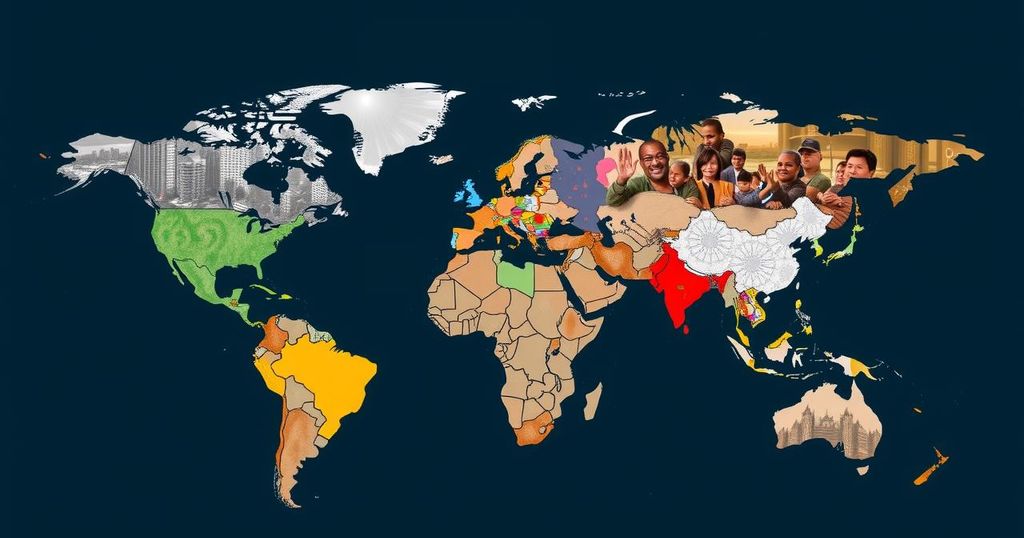Grim Humanitarian Crisis: Aid Worker Fatalities Rise Amid Global Conflict
In 2024, humanitarian worker fatalities have reached a record 281, with conflict in Gaza significantly contributing to this crisis. Violent conditions in Lebanon, Haiti, Ukraine, and Guinea further exacerbate global humanitarian needs. Ongoing military operations limit access to essential aid, and the UN emphasizes the urgent need for governmental protection of aid workers and support for displaced populations as winter approaches.
In 2024, fatalities among aid workers have reached alarming levels, with the loss of 281 lives, marking it the deadliest year recorded. Tom Fletcher, the Under-Secretary-General for Humanitarian Affairs, condemned the unprecedented rate of violence towards humanitarian workers, emphasizing the necessity for states to protect them in accordance with international law. In Gaza, escalating conflict has significantly contributed to these deaths, with over 320 humanitarian personnel killed since October 7 of the previous year.
The humanitarian crisis in the Occupied Palestinian Territory continues to escalate as Israeli military actions intensify, causing severe suffering among Palestinians. Reports indicate that around 40 families in Nuseirat lost their homes due to recent shelling. Access restrictions are hampering critical aid, as only one-third of humanitarian missions have been permitted by Israeli authorities. With winter approaching, there is an urgent need for adequate shelter, yet minimal supplies are reaching those affected.
In Lebanon, ongoing Israeli airstrikes have led to significant civilian casualties, including 40 fatalities in a single event. The World Health Organization reports numerous attacks on healthcare facilities, urging respect and protection for medical personnel under international humanitarian law. The UN continues to support humanitarian efforts, providing essential winter assistance and food to displaced populations.
Haiti is witnessing increasing violence displacing citizens, with over 40,000 individuals forced from their homes recently. The UN is actively providing essential supplies, including water and medical consultations, amidst this volatile environment.
In Ukraine, continuous hostilities are exacerbating humanitarian needs as winter arrives, with significant casualties reported from recent strikes. The humanitarian situation remains precarious, especially in frontline communities. The UN and humanitarian partners are delivering vital emergency assistance.
Lastly, in Guinea, $2.5 million has been allocated to address the needs of those affected by recent floods, offering critical health, food, water, and educational support to over 60,000 individuals.
Efforts by various humanitarian organizations are crucial amidst the troubling global landscape, underscoring the importance of national and international cooperation to protect the vulnerable and ensure the safety of aid workers.
The report examines the pressing humanitarian crises affecting several regions across the globe, including the Occupied Palestinian Territory, Lebanon, Haiti, Ukraine, and Guinea. It highlights the increasing dangers faced by aid workers, particularly in conflict zones, and reviews the implications of military operations on civilian populations. The document provides a detailed analysis of the challenges faced by humanitarian operations, including access restrictions, violence, and the urgent need for resources as winter approaches. This situation stresses the need for protection measures for humanitarian workers and the importance of international humanitarian law.
The escalating humanitarian crises in various regions reveal a dire need for urgent intervention and protection for vulnerable populations. With alarming fatalities among aid workers and prohibitive conditions affecting access to humanitarian aid, it is imperative for the global community to intensify efforts in safeguarding those who serve during emergencies. Additionally, addressing the essential needs of displaced persons in conflict zones must be prioritized, ensuring adequate shelter, food, and medical assistance as winter approaches.
Original Source: www.unocha.org




Post Comment